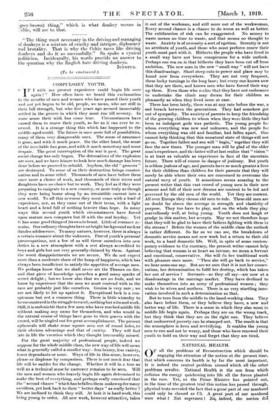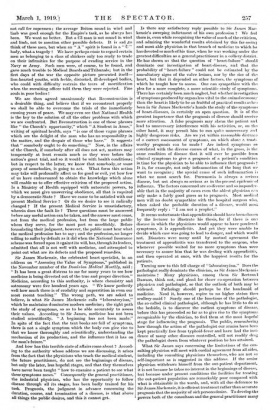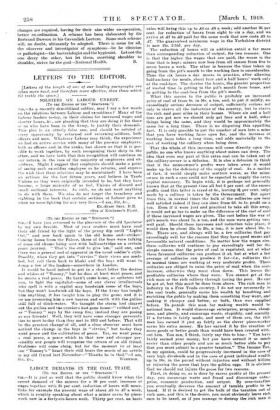NATIONAL HEALTH.
OF all the problems of Reconstruction which should he engaging the attention of the nation at the present time, that which concerns its health is by far the most important. It is indeed the central problem around which all the other problems revolve. National Health is the sun from which radiator the energy quickening into life all the forces planted in the race. Yet, as the Prime Minister has pointed out, in the time of the greatest trial this nation has passed through. physical tests revealed the fact that a great part of our manhood could only be classed as C3. A great part of our manhood were what ? Not supermen ! No, indeed, the nation did
not call for supermen ; the average Briton sound in wind and limb was good enough for the Empire's task, as he always has been. We want no better. But a C3 man is not sound in wind and limb, not to mention other possible defects. It is sad .to think of these men, but when an " A " spirit is found in a " t!"
body, what a tragedy ! We have perhaps conic to regard certain men as belonging to a class of shirkers only too ready to trade on their infirmities for the purpose of evading service in the Navy or Army. Such men were, of course, to be found, and gave much trouble to Medical Boards and Tribunals; but in the first days of the war the opposite picture presented itself— lion-hearted youths, with feeble, distorted, ill-developed bodies, who could with difficulty restrain the tears of mortification when the recruiting officer told them they were rejected. Fine souls in poor bodies !
We are then agreed unanimously that Reconstruction is a desirable thing, and believe that if we reconstruct properly we shall be able to overcome the trials of the immediately ensuing years of peace. We may even see that National Health is the key to the solution of all the other problems with which we are confronted. But Reconstruction is one of those phrases like " the Church's opportunity," which "A Student in Arms," writing of spiritual health, says " is one of those vague phrases which are the delight of the man who has no responsibility in the matter, and the despair of those who have." It suggests that " somebody ought to do something." Now, in the affairs of the Church, if somebody after all does not act, matters may temporarily at least remain much as they were before the nation's great trial, and so it would be with health conditions ; but in respect to the latter, we know that somebody, or some group of somebodies, is going to act. What form this action may take will profoundly affect us for good or evil, yet how few of us have endeavoured to obtain the knowledge which alone will enable us to offer effective criticism of the proposed action. Is a Ministry of Health equipped with autocratic powers, to which we must give unswerving obedience, all that is required by a democratic State ? Have we cause to be satisfied with our present Medical Service ? Or do we desire to see it radically changed ? If the present Medical Service is unsatisfactory, wherein does the fault lie ? These questions must be answered before any useful action can be taken, and the answer must come, not from the medical profession, but from the large public whom they serve, for the most part so unselfishly. Before formulating their judgment, however, the public must hear what
the medical profession has to say ; and the profession, no longer willing to suffer by default as it did when the National Insurance scheme was forced upon it against its will, has, through its leaders, admitted that all is not well with medicine, and attempted to point out what are its defects and the proposed remedies.
Sir James Mackenzie, the celebrated heart.specialist, in an address on "Assessing the Value of Symptoms," published in
the November number of the Dominion Medical Monthly, said :
" It has been a great distress to me for many years to see how medicine is being diverted out of the true and proper direction."
Medicine, according to this authority, is where chemistry and astronomy were five hundred years ago. " We know perfectly well how much there is of credulity and superstition in even our most recent teaching." The wrong path, we are asked to
believe, is what Sir James Mackenzie calls "laboratory-ism," which he maintains dominates modern medicine; the right path
the study of symptoms, so as to be able accurately to assess their values. According to Sir James, medicine has not been studied scientifically. "A beginning has not been made."
In spite of the fact that the text-books are full of symptoms, there is not a single symptom which the body can give rise to that we know thoroughly and scientifically, understanding the mechanism of its production, and the influence that it has on the man's future."
And how has this terrible state of affairs come about ? Accord- ing to the authority whose address we are discussing, it arises from the fact that the physicians who teach the medical student, the future practitioner, do not see the beginnings of disease, but only the later, less hopeful stages, and that they themselves have never been taught " how to examine a patient to see what these symptoms mean." Consequently the general practitioner, the industrial physician, who has the opportunity to follow disease through all its sieges, has been badly trained for his task. Prognosis, the judgment in advance concerning the duration, course, and termination of a disease, is what above all things the public desires, and this it cannot get..
Is there any satisfactory reply possible to Sir James Mac- kenzie's sweeping indictment of his own profession ? Wo feel there is, even while recognizing the value of much of the criticism, and admiring the wonderful results obtained by this far-seeing and most able physician in that branch of medicine to which he has devoted so much of his time, when he was working under the greatestdiffioulties as a general practitioner in a colliery district. lie has shown us that the question of "heart-failure amid dominate our investigation of heart-disease, and that the probability of " heart-failure " could not be estimated by the auscultatory signs of the valve lesions, nor by the size of the heart, but that it depended on other factors, the symptoms of which he taught how to assess. One can sympathize with the plea for a more complete, a more scientific study of symptoms. There has certainly been much neglect, but whether investigation of symptoms produced by organs less vital to the animal economy than the heart is likely to be so fruitful of practical results as has been in Sir James Mackenzie's hands the study of the symptoms of heart-diseases, is certainly an open question. It is of the greatest importance that the prognosis of disease should receive more attention. A false prognosis may alarm the patient and lead to unnecessary interference with his activities, or, on the other hand, it may permit hint to run quite unnecessary Earl highly dangerous risks. Are we yet within reasonable distance of a correct assessment of symptoms, on which alone a trust- worthy prognosis can be made ? Are indeed symptoms so correlated with the diverse causes of what, in the gross, is the same condition of disease that it will ever be possible from clinical symptoms to give a prognosis of a patient's condition in time for the physician to be able to influence that prognosis 7 It is, for example, not only inflammation of the lung that we want to recognize ; the special cause of such inflammation ii what we must search for. Pneumonia is always a serious disease, but not always so serious as in thepresent epidemic of influenza. The factors concerned are so diverse and so imponder- able that in the majority of cases even the ablest physician ens only make a fairly good guess as to prognosis. Most medical men will no doubt sympathize with the hospital surgeon who, when asked the probable duration of a disease, would most frequently reply : "I am not a prophet."
It seems unfortunate that appendicitis should have been chosen by the lecturer to illustrate his thesis, for if there is one disease in which the physicians would appear to have pondered symptoms, it is appendicitis. And yet they were unable to decide which case was going to lead to danger, and which would not. Disasters were many until by mutual agreement the treatment of appendicitis was transferred to the surgeon, who whenever possible waited for no more symptoms than were necessary to assure him that he was dealing with appendicitis, and then operated at once, with the happiest results for the patients.
Turning now to this fell charge of " laboratoryism." Does the pathologist really dominate the clinician, as Sir James Mackenzie maintains ? Many physicians, among them Sir Bertrand Dawson, think not, and plead for closer cooperation between physician and pathologist, so that the outlook of both may be widened. Pathology should perhaps be the handmaid of medicine. Need it, however, aspire to no higher status than scullery-maid ? Surely one of the functions of the pathologist. the so-called clinical pathologist, although he has little to do at the bedside, is to discover the earliest symptoms of disease, before this has proceeded 80 far as to give rise to the symptom: recognizable by the clinician, to find them at the most hopeful stage for influencing the prognosis. The public, remembering how through the action of the pathologist our armies have been kept practically free from typhoid-fever and have had the inci- dence of many other diseases controlled, will not readily drag the pathologist down from whatever position he has attained.
What Sir James says concerning the limitations of the con- sulting physician will meet with cordial agreement from all sides. including the consulting physicians themselves, who are notes self-important as is suggested in this address. If the senior physician withdraws himself from the out-patient department. it is not because he takes no interest in the beginnings of disease, but because under present conditions the facilities for treating the out-patient population are remarkably poor compared with what is obtainable in the wards, and, with all due deference to Sir Janie Mackenzie, it is efficient treatment rather than accurate prognosis that the majority of sick persons desire. To develop the powers both of the consultant and the general practitioner many changes are required, having for their aim wider co-operation, better co-ordination. A scheme has been elaborated by Sir Bertrand Dawson in his Cavendish Lecture. Some such scheme will, no doubt, ultimately be adopted. There is room for all, the observer and investigator of symptoms—be he clinician or pathologist—the bacteriologist and the hygienist. Let not the one decry the other, but let them, marching shoulder to
shoulder, strive for the goal—National Health. S.




































 Previous page
Previous page